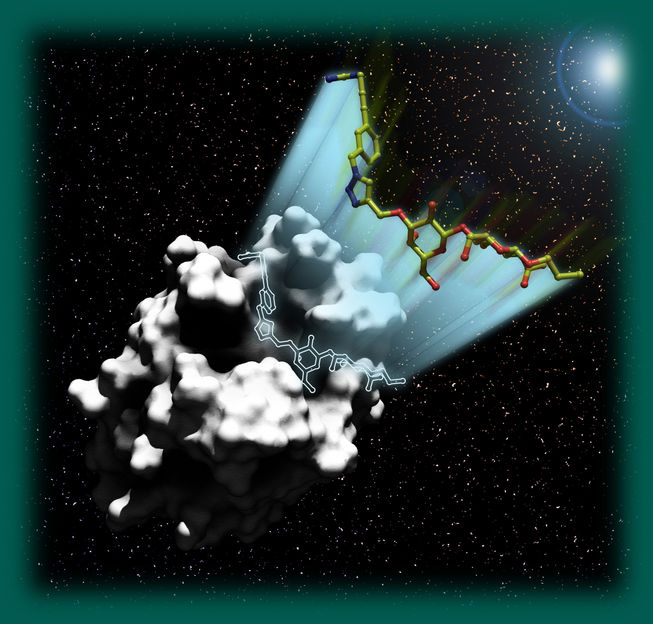Cancer detection with sugar molecules
Scientists from the University of Würzburg have synthesized a complex sugar molecule which specifically binds to the tumor protein Galectin-1. This could help to recognize tumors at an early stage and to combat them in a targeted manner.

Like a spaceship, the complex sugar molecule (coloured) lands exactly on the tumor protein galectin-1, which here looks like a meteorite and is shown in black and white.
AK Seibel, VCH-Wiley
Galectins are a family of proteins that have become a promising source of cancer research in recent years. A representative thereof is galectin-1. It sits on the surface of all human cells; on tumor cells, however, it occurs in enormous quantities. This makes it an interesting target for diagnostics and therapy.
"Among other things, it is known that galectin-1 hides the tumor cells from the immune system," explains Professor Jürgen Seibel of the Institute of Organic Chemistry at the Julius-Maximilians-Universität (JMU) Würzburg in Bavaria, Germany. Recent studies have shown that when Galectin-1 is blocked, the immune system can recognize the tumor and attack it with T cells.
Sugar molecule with docking station
No wonder, therefore, that galectin-1 has become a major focus of research. Seibel and his colleague Dr. Clemens Grimm is interested in a very specific section of this protein, the so-called carbohydrate recognition domain. They have now designed a complex sugar molecule that fits perfectly into this domain, as the scientists report in journal "ChemBioChem".
"We have equipped the sugar molecule with a docking site, for example, to connect it with a fluorescent dye or an drug," says Seibel. In addition, the scientists have described the binding of their molecule to galectin-1 with high-resolution X-ray structure analyzes.
"Our findings can serve the development of high-affinity ligands of the protein Galectin-1 and thus of new drugs," said Clemens Grimm.
Quick test for Galectin-1 in progress
Now the JMU scientists are working on a rapid test for the detection of galectin-1. It is designed to enable early detection of tumors such as neuroblastoma. For the future, Seibel's team would like to expand the sugar molecules into a kind of shuttle system that allows pharmaceutical agents to be transported directly to the tumors.
Original publication
Other news from the department science

Get the analytics and lab tech industry in your inbox
By submitting this form you agree that LUMITOS AG will send you the newsletter(s) selected above by email. Your data will not be passed on to third parties. Your data will be stored and processed in accordance with our data protection regulations. LUMITOS may contact you by email for the purpose of advertising or market and opinion surveys. You can revoke your consent at any time without giving reasons to LUMITOS AG, Ernst-Augustin-Str. 2, 12489 Berlin, Germany or by e-mail at revoke@lumitos.com with effect for the future. In addition, each email contains a link to unsubscribe from the corresponding newsletter.






















































